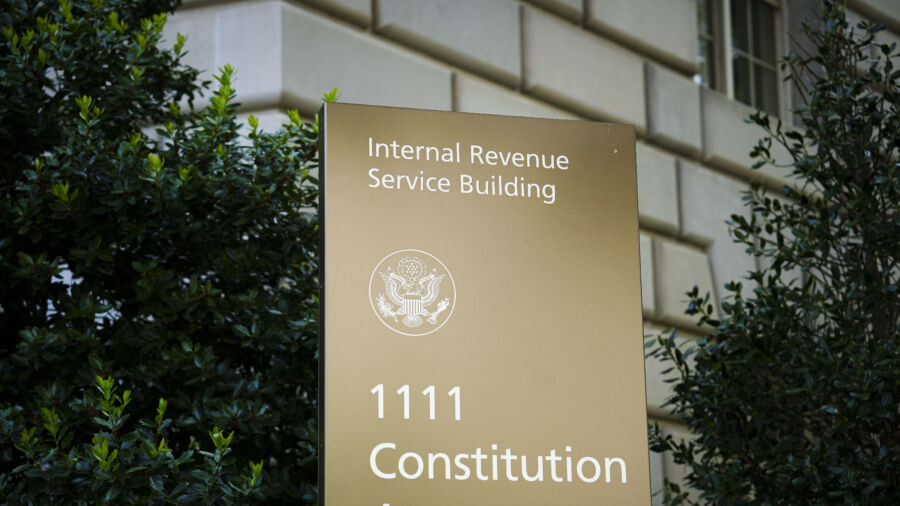The Internal Revenue Service (IRS) reminded taxpayers that the 2024 tax-filing season is due to begin by the end of this month and asked them to “take steps now” to file returns on time.
Jan. 29 will be the official start date of the 2024 tax season when the agency will start accepting and processing returns for the 2023 tax year, the IRS said in a Jan. 8 press release. The agency is expecting over 128.7 million individual tax returns to be filed by the tax deadline of April 15. For residents in Maine and Massachusetts, the deadline will be on April 17 due to Patriot’s Day and Emancipation Day holidays. Deadlines may also be extended in case a taxpayer is living in a federally declared disaster area.
“Although the IRS will not officially begin accepting and processing tax returns until Jan. 29, people do not need to wait until then to work on their taxes if they’re using software companies or tax professionals.” For instance, many software firms accept tax return submissions and hold them until IRS processing begins.
“IRS Free File will also be available on IRS.gov starting Jan. 12 in advance of the filing season opening.” The service will be available for any taxpayers whose Adjusted Gross Income was less than $79,000 last year.
“The IRS Direct File pilot will be rolled out in phases as final testing is completed and is expected to be widely available in mid-March to eligible taxpayers in the participating states.” Qualifying states include Arizona, California, Florida, Massachusetts, New Hampshire, New York, Nevada, South Dakota, Tennessee, Texas, Washington, and Wyoming.
Important dates for the 2024 filing season:
- Jan. 12: IRS Free File opens.
- Jan. 16: Due date for 2023 fourth quarter estimated tax payments.
- Jan. 26: Earned Income Tax Credit Awareness Day.
- Jan. 29: Filing season start date for individual tax returns.
- April 15: Due date of filing a tax return or to request an extension for most of the nation.
- April 17: Due date for Maine and Massachusetts.
- Oct. 15: Due date for extension filers.
The agency asked people to “take steps now” to get ready to file their 2023 returns by ordering and gathering all necessary tax records like Social Security numbers, Individual Taxpayer Identification numbers, Adoption Identification numbers, and this year’s Identity Protection Personal Identification numbers (IP PIN).
“People should report all their taxable income and wait to file until they receive all income-related documents. This is especially important for people who may receive various Forms 1099 from banks or other payers reporting unemployment compensation, dividends, pensions, annuities, or retirement plan distributions,” the IRS said.
“If a taxpayer receives Forms 1099-K, they should visit, ‘What to do with Form 1099-K,’ to help them determine if that money should be reported as income on their federal tax return.”
The agency advised taxpayers to file their returns electronically with direct deposit as it is the “fastest and easiest way” to both file and receive a refund. The IRS usually issues refunds in less than 21 days. However, if a tax return requires additional review, the process could take longer.
IRS New Services
The IRS listed some of the new tools and resources aimed at improving taxpayer services:
- Taxpayer assistance centers have been opened to provide “expanded in-person service.”
- The IRS toll-free line now offers “increased help” and has an expanded customer callback feature aimed at significantly reducing wait times.
- The “Where’s My Refund?” tool has been updated to provide taxpayers with “more detailed refund status messages in plain language.”
- “Enhanced paperless processing that will enable taxpayers to submit all correspondence, non-tax forms, and responses to notices digitally and will be able to e-File 20 additional tax forms. Achieving this milestone will enable up to 125 million paper documents to be submitted digitally per year.”
- The IRS Individual Online Account has been enhanced with new options like scheduling and canceling future payments, validating and saving bank accounts, and revising payment plans.
The IRS credited “significant improvements” in service to the passage of the Inflation Reduction Act. “As our transformation efforts take hold, taxpayers will continue to see marked improvement in IRS operations in the upcoming filing season,” said IRS Commissioner Danny Werfel.
“IRS employees are working hard to make sure that new funding is used to help taxpayers by making the process of preparing and filing taxes easier.”
On Monday, the agency launched a “Tax Professional Awareness Week” to assist tax professionals on what to expect in the upcoming filing season. The IRS intends to tackle multiple issues like identity theft, due diligence issues, and e-filing during the week.
Meanwhile, the IRS is sending letters to millions of Americans who have tax debts prior to tax year 2022. “These notices and letters were previously paused due to the pandemic and high inventories at the IRS but will gradually resume during the next several months,” the agency said.
The letter will remind taxpayers of the taxes they owe to the IRS and advise them to contact the agency or prepare “alternative arrangements” to settle the debt.
There are multiple reasons why taxpayers should consider filing their taxes as early as possible rather than wait until the last minute. Preparing to file early will help identify the exact amount owed to the agency and give enough time to arrange the payment.
Pushing filing too close to the deadline can end up with the taxpayer taking a filing extension. They may also require the help of a tax professional to assist them in filing the return if it is too complicated and there is little time to file. Earlier filing means that the taxpayer stands to get their tax refunds early as well.
From The Epoch Times


